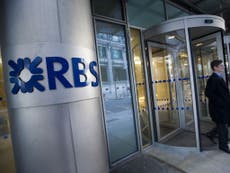So-called 'challenger banks' are employing the same senior executives that oversaw the RBS debacle
It turns out these banks are not quite as fresh and novel as we might first have assumed

“Challenger bank”. It sounds an exciting, evangelical, crusading sort of affair – an organisation dedicated to a renewed passion to serving its customers, concentrating on old-fashioned banking business and doing so with some old-fashioned banking ethics.
Now, thanks to an investigation by The Independent, we discover that these banks are not quite as fresh and novel as we might first have assumed, or, indeed, have hoped. Many employ senior executives who saw service under the Fred Goodwin regime at Royal Bank of Scotland (RBS). During this period, Goodwin oversaw over-ambition, overstretch, eventual collapse and majority state ownership of that bank. It was among the most shaming episodes in British financial history.
In true newspaper style, we might well ask: “Where are they now?” The answer – running a new breed of banks – has a satirical feel to it.
In any case, the new entrants to the banking scene have made comparatively little progress. Meanwhile, the reborn TSB, spun out of the Lloyds-Halifax Bank of Scotland (HBOS) behemoth, was soon gobbled up by the Spanish bank Sabadell. But as the fate of Lehman Brothers and others demonstrates, nothing lasts forever in finance, and it may be that, with the right leadership and support, these new challengers can make genuine progress against a well established oligopoly.
The various financial regulators, sub-regulators and masters of political theory – the Treasury, the Bank of England, the Financial Conduct Authority (FCA) and others – have not seen to it that British consumers or small businesses have more access to finance and, conversely, a more creative market for their savings. Given the ultra-low interest rate regime and banks’ conservative lending policies, such a shake-up in the market is long overdue.
So the Big Four groups – Lloyds, RBS, Barclays and HSBC – still dominate the domestic sector. Yet, it need not be thus.
Before the merger mania of the 1960s and the crisis-driven nationalisations and forced acquisitions of the 2000s, Britain had a vibrant financial ecosystem. The UK banking system boasted clearing banks often with a regional bias and strong understanding of local needs. It had a mix of players from The Co-operative Bank (which fell prey to its sui generis weaknesses), through family-dominated businesses to the conservatively managed quoted concerns. Alongside them was the biggest building society movement in the world – mutually owned and, again, often closely linked to communities.
As we know, the deregulation and flotation on the stock market of those societies in the 1980s to the 2000s, such as Northern Rock and Bradford & Bingley, did nothing more than liberate them to make fatal mistakes.
As well as taxpayers’ money that disappeared, and the shareholders’ funds that were wiped out, a great deal of intangible value was lost in the financial crisis. For too long, the suspicion among the public has been that it has become business as usual for the banks – and the cancellation of the FCA’s inquiry into banking culture and the recycling of old bankers in new jobs suggests the public are right.


Join our commenting forum
Join thought-provoking conversations, follow other Independent readers and see their replies